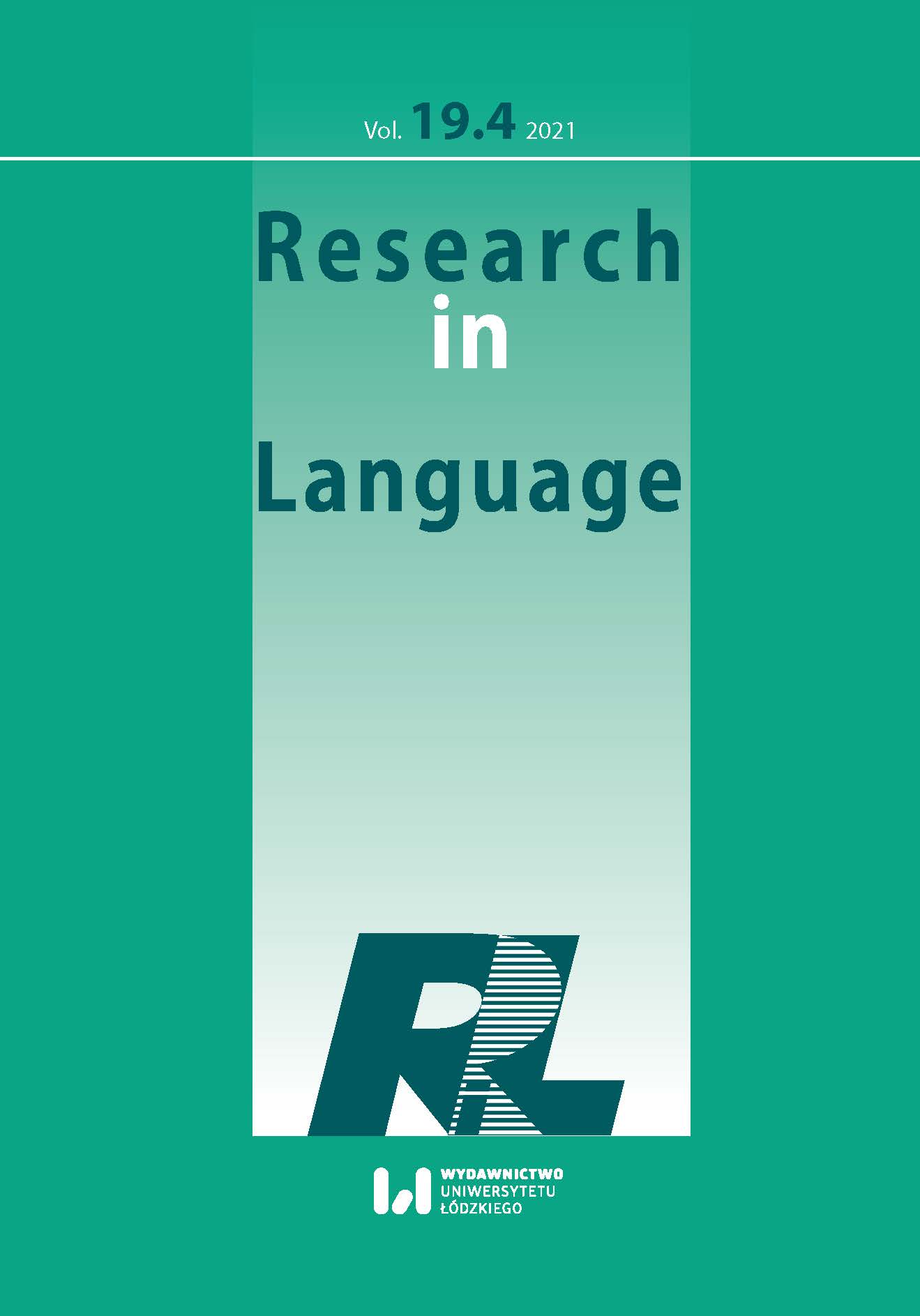Multidimensionality of “Europäische Identität” Notion in German Mass Media
DOI:
https://doi.org/10.18778/1731-7533.19.4.06Keywords:
European identity, collocator, political concept, discourse construction, multidimensionalityAbstract
This paper uses communicative-pragmatic analysis and a corpus-based method to investigate multidimensional axiological interpretation of Europäische Identität notion as a unifying political concept. The study focuses on European identity discourse as presented in German mass media. The study shows strategic relevance of the concept and its unifying potential both within the EU framework, and in wider European domain. The analysis reveals that primary and secondary collocators actualized with the notion convey both the topicality and inconsistency of the concept. Moreover, the results show that identity and personal / collective self-determination discourse is characterized by polemic nature and various evaluations that predominantly feature the tactics of doubt and mistrust to the unifying potential of European identity concept.
References
Brubaker, Rodgers and Frederic Cooper. 2000. Beyond “Identity”. Theory and Society. 29 (1). 1-47.
Google Scholar
DOI: https://doi.org/10.1023/A:1007068714468
Bryman, Alan. 2008. Social Research Methods. 3rd edn. Oxford, New York: Oxford University Press.
Google Scholar
Bubenhofer, Noah. 2009. Sprachgebrauchsmuster. Korpuslinguistik als Methode der Diskurs- und Kulturanalyse. Berlin, New York: de Gruyter.
Google Scholar
Bubenhofer, Noah. 2013. Quantitativ informierte qualitative Diskursanalyse. Korpuslinguistische Zugänge zu Einzeltexten und Serien. In Roth, Kersten S. and Carmen Spiegel (eds.). Angewandte Diskurslinguistik. Felder, Probleme, Perspektiven, 109-134. Berlin: Akademie-Verlag.
Google Scholar
DOI: https://doi.org/10.1524/9783050061054.109
Caspari, Lisa. 2011. Wie die Partei, so die Europa-Vision. Die Zeit. [Online] 31st August. Available from: https://www.dwds.de/r?q=europ%C3%A4ische%20Identit%C3%A4t;corpus=zeit;format=full;p=1;sort=date_desc;limit=50 [Accessed: 26th May 2018].
Google Scholar
Checkel, Jeffrey T. and Peter J. Katzenstein (eds.). 2009. European Identity. Cambridge: Cambridge University Press.
Google Scholar
DOI: https://doi.org/10.1017/CBO9780511806247
Delanty, Gerard. 1995. Inventing Europe. Idea, Identity, Reality. Basingstoke: Palgrave Macmillan.
Google Scholar
DOI: https://doi.org/10.1057/9780230379657
Derrida, Jacques. 1992. Das andere Kap. Die vertagte Demokratie. Zwei Essays zu Europa. Frankfurt am Main: Suhrkamp.
Google Scholar
Dijk, Teun Adrianus van. 2007. The Study of Discourse: An Introduction In Discourse Studies, vol. 2, xix-xli. London: Eage.
Google Scholar
Document on the European Identity by the Nine Foreign Ministers (Copenhagen, 14 December 1973). 1973. [Online]. Available from: http://www.cvce.eu/obj/declaration_on_european_identity_copenhagen_14_december_1973-en-02798dc9-9c69-4b7d-b2c9-f03a8db7da32.html [Accessed: 26th May 2018].
Google Scholar
Dückers, Tanja. 2015. Von Geburt an Multikulturalist. Die Zeit. [Online] 6th February. 5. Available from: https://www.dwds.de/r?q=Europ%C3%A4ische%20Identit%C3%A4t;corpus=zeit;format=full;p=1;sort=date_desc;limit=50 [Accessed: 26th May 2018].
Google Scholar
Eriksen, Erik O. 2007. Deliberation und demokratische Legitimität in der EU. Zwischen Konsens und Kompromiss. In Niesen, Peter and Benjamin Herborth (eds.), Anarchie der kommunikativen Freihet. Jürgen Habermas und die Theorie der internationalen Politik, 294-320. Frankfurt am Main: Suhrkamp.
Google Scholar
Erikson, Erik H. 1968. Identity: Youth and Crisis. New York, London: W.W. Norton & Company.
Google Scholar
Fairclough, Norman. 2003. Analysing Discourse. New York: Routledge.
Google Scholar
DOI: https://doi.org/10.4324/9780203697078
Fritz-Vannahme, Joachim and Petra Pinzler. 2003. Geht’s nicht auch eine Nummer kleiner? Die Zeit. 12th April. 50. Available from: https://www.dwds.de/r?q=Europ%C3%A4ische%20Identit%C3%A4t;corpus=zeit;format=full;p=2;sort=date_desc;limit=50 [Accessed: 26th May 2018].
Google Scholar
Gauck, Joachim W. 2013. Gaucks Europa-Rede im Wortlaut. Die Zeit. [Online] 22nd February. 9. Available from: https://www.dwds.de/r?corpus=zeit;q=europ%C3%A4ische%20Identit%C3%A4t/ [Accessed: 26th May 2018].
Google Scholar
Guérot, Ulrike. 2017. In Spaniens Krise offenbart sich eune neue EU. Die Zeit. [Online] 10th October. Available from: https://www.dwds.de/r?corpus=zeit;q=Europ%C3%A4ische%20Identit%C3%A4t [Accessed: 26th May 2018].
Google Scholar
Habermas, Jürgen. 1981. Theorie des kommunikativen Handelns. Vol. 2. Frankfurt am Main: Suhrkamp.
Google Scholar
Harré, Rom and Grant Gillett. 1994. The Diskursive Mind. London: Thousand Oaks.
Google Scholar
DOI: https://doi.org/10.4135/9781452243788
Heidegger, Martin. 1967. Sein und Zeit. 11th. edn. Tübingen: Niemeyer.
Google Scholar
Kocka, Jürgen. 2002. Wo liegst du, Europa? Die Zeit. [Online] 28th November. 49. Available from: https://www.dwds.de/r?q=Europ%C3%A4ische%20Identit%C3%A4t;corpus=zeit;format=full;p=3;sort=date_desc;limit=50 [Accessed: 26th May 2018].
Google Scholar
Krzyzzanowski, Michał, Triandafyllidou, Anna and Ruth Wodak. 2009. Intoduction. In Triandafyllidou, Anna, Wodak, Ruth and Michał Krzyzzanowski (eds.), Conclusions: Europe, Media, Crisis and the European Public Sphere. 1-12. Basingstoke: Palgrave Macmillan.
Google Scholar
DOI: https://doi.org/10.1057/9780230271722_13
Lichtenstein, Dennis. 2014. Europäische Identitäten. Eine vergleichende Untersuchung der Medienöffentlichkeiten ost- und westeuropäischer EU-Länder. München: UVK Verlagsgesellschaft.
Google Scholar
Mead, George H. 1968. Geist, Identität und Gesellschaft. Frankfurt am Main: Suhrkamp
Google Scholar
Mingers, John and John Brockelsby. 1997. Multimethodology: Towards a Framework of Mixing Methodologies. Omega, Int. Mgmt. Sci, 25 (5). 489-509.
Google Scholar
DOI: https://doi.org/10.1016/S0305-0483(97)00018-2
New Dictionary of the History of Ideas. 2005. [Online]. Available from: https://www.encyclopedia.com/history/dictionaries-thesauruses-pictures-and-press-releases/personal-and-social-identity#ixzz5HGNfqCIy [Accessed: 26th May 2018].
Google Scholar
Polack, Alexander. 2002. Kritische Dikursanalyse – ein Forschungsansatz an der Schnittstelle von Linguistik und Ideologiekritik. Zeitschrigt für angewandte Linguistik. 36. 33-48.
Google Scholar
Pressestimmen. 2004. Berliner Zeitung. [Online] 9th September. Available from: https://www.dwds.de/r?corpus=bz;q=Europ%C3%A4ische%20Identit%C3%A4t [Accessed: 26th May 2018].
Google Scholar
Risse, Thomas. 2005. Neofunctionalism, European Identity, and the puzzles of European Integration. Journal of European Public Policy. 12 (2). 291-309.
Google Scholar
DOI: https://doi.org/10.1080/13501760500044033
Saxer, Ulrich. 2006. Europäischer Gesellschafts-, Medien- und Öffentlichkeitswandel – eine kommunikationssoziologische Perspektive. In Langenbucher, Wolfgang R. and Michael Latzer (eds.). Europäische Öffentlichkeit und medialer Wandel. Eine transdisziplinäre Perspektive. 62-92. Wiesbaden: VS Verlag für Sozialwissenschaften.
Google Scholar
DOI: https://doi.org/10.1007/978-3-531-90272-2_3
Sedmak, Clemens. 2010. Europäische Grundwerte, Werte in Europa: Einleitung zzum Gesamtprojekt. In Sedmak, Clemens. (ed.). Solidarität. Vom Wert der Gemeinschaft. 9-42. Darmstadt: WBG.
Google Scholar
Sinclair, John. 2004. Trust the Text. Language, Corpus and Discourse. London: Routledge.
Google Scholar
DOI: https://doi.org/10.4324/9780203594070
Stubbs, Michael. 1996. Text and Corpus Analysis: Computer-assisted Studies of Language and Culture. Oxford: Blackwell.
Google Scholar
Thiel, Markus. 2011. The Limits of Transnationalism: Collective Identities and EU Integration. New York: Palgrave Macmillan.
Google Scholar
Wie europäisch ist Europa? 2012. Die Zeit. [Online] 25th September. Available from: https://www.dwds.de/r?q=europ%C3%A4ische%20Identit%C3%A4t;corpus=zeit;format=full;p=1;sort=date_desc;limit=50 [Accessed: 26th May 2018].
Google Scholar
Wodak, Ruth and Michael Mayer. 2009. Critical Discourse Analysis: History, Agenda, Theory and Methodology. In Wodak, Ruth and Michael Mayer. (eds.). Methods of Critical Discourse Analysis. 2nd edn., 1-33. London: Sage.
Google Scholar
Downloads
Published
How to Cite
Issue
Section
License

This work is licensed under a Creative Commons Attribution-NonCommercial-NoDerivatives 4.0 International License.










